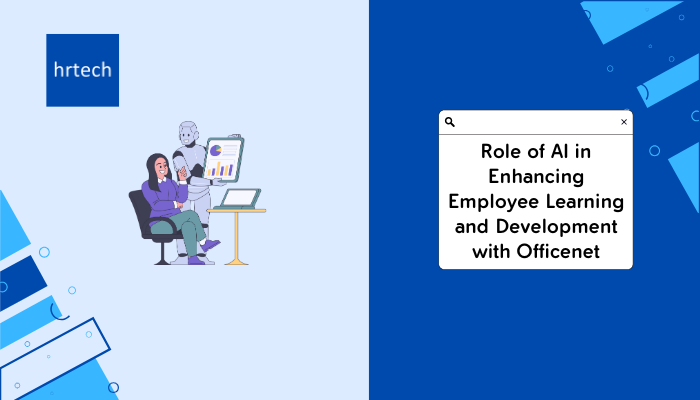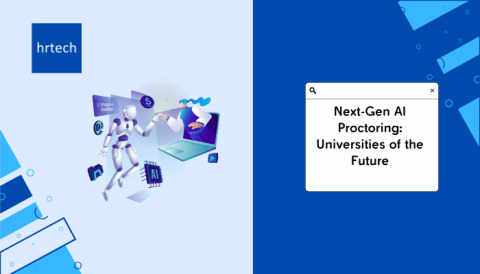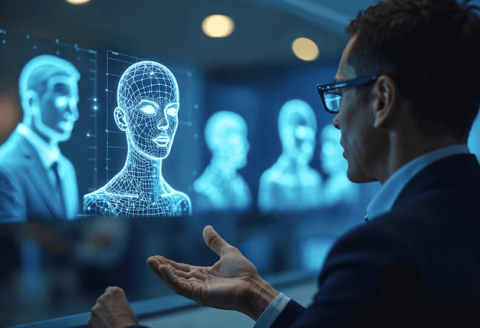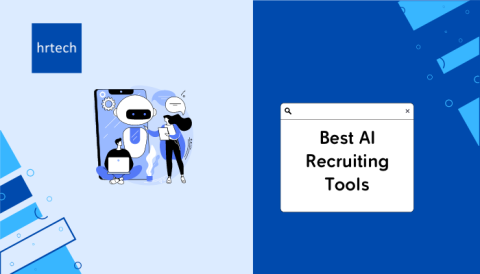Artificial Intelligence (AI) is transforming industries, and human resource management is no exception. In learning and development (L&D), AI enables organizations to create tailored, efficient, and engaging training programs. With Officenet’s 15 years of expertise in serving industries like manufacturing, the platform leverages advanced AI-powered solutions to unlock employee potential, drive continuous growth, and align workforce development with business goals.
In this article, we explore how AI is reshaping employee learning and development, focusing on personalizing educational paths, improving accessibility, and boosting overall outcomes.
The Evolving Role of AI in Learning & Development (L&D) and Human Resources (HR)
AI is redefining the future of Learning & Development (L&D) and Human Resources (HR) by enabling personalized, data-driven, and efficient solutions to meet evolving workforce challenges.
- Increased Importance of AI in L&D and HR:
- AI is becoming vital as businesses face evolving challenges in workforce management and skills development.
- AI enables HR teams to adapt quickly to changing organisational and employee needs.
- Streamlining HR Processes:
- AI automates routine HR tasks such as scheduling, employee data management, and payroll, reducing administrative burden.
- AI-driven tools improve efficiency and accuracy in HR operations.
- Personalised Training Experiences:
- AI customises learning paths based on individual employee needs, skill gaps, and career aspirations.
- Adaptive learning technology helps deliver engaging, tailored training content.
- Data-Driven Insights for L&D:
- AI analyses performance data to identify trends and gaps in employee development.
- Predictive analytics offer valuable insights that help HR teams make informed decisions.
- Agile, Data-Driven HR Strategies:
- AI enables HR departments to be more responsive and proactive in developing strategies that align with business goals.
- Real-time data allows HR to monitor employee progress and adjust strategies accordingly.
Officenet’s AI-powered tools offer actionable insights, helping businesses accelerate workforce training and improve employee performance.
As AI continues to transform HR and L&D, it’s important to understand the current challenges and opportunities within these fields to leverage its potential fully.
The Current Landscape of L&D and HR
As organisations strive to adapt to the changing demands of the modern workforce, the landscape of L&D and HR is rapidly evolving.
1. Traditional Methods Falling Short:
- Traditional training models are no longer effective for the diverse and dynamic workforce.
- Many businesses continue to use outdated methods that lack flexibility, scalability, and personalisation.
2. Challenges Faced by HR Teams:
- HR teams are burdened with inefficient, time-consuming processes and siloed data.
- Compliance and regulatory issues add to the complexity of HR management.
3. The Shift Toward Digital Tools:
- Companies are turning to digital solutions that offer greater scalability and personalisation in L&D.
- The rise of AI-powered systems is making training more adaptable to individual employee needs.
4. AI’s Role in Overcoming Barriers:
- AI-driven systems offer tailored, scalable solutions that adapt to individual needs.
- Officenet empowers businesses to overcome these challenges with its AI-powered learning platform.
To fully embrace the potential of AI, it’s crucial to first understand the key challenges that L&D and HR teams face in today’s rapidly evolving workforce landscape.
Key Challenges Faced by L&D and HR in the Modern Workplace
The modern workplace presents several challenges for L&D and HR departments:
- Skill Gaps: Rapid technological advancements are creating skill shortages. Organisations need to upskill their workforce to stay competitive continuously.
- Employee Engagement: Traditional training methods often fail to engage employees. Lack of personalisation leads to lower completion rates and reduced retention.
- Efficiency in Training: Training can be time-consuming and costly, with no guarantee of improving performance or aligning with company objectives.
- Compliance & Regulation: Companies must adhere to complex labour laws and industry standards, which can be difficult to track and manage manually.
AI helps address these issues by offering tailored training solutions, automating administrative tasks, and improving overall HR efficiency. Officenet addresses these challenges with AI-driven solutions that offer personalized learning experiences, automate administrative tasks, and ensure compliance.
The Need for Innovation and Adaptation
With over 15 years of expertise in serving the manufacturing sector, Officenet offers AI-powered Learning & Development solutions that combine innovation, scalability, and efficiency.
- Innovation in HR and L&D is essential: Growing businesses face evolving challenges, making innovation a necessity, not an option.
- Employee expectations: Today’s workforce demands personalized and flexible learning opportunities tailored to their needs.
- Organizational needs: Companies require training solutions that are cost-effective, scalable, and deliver measurable impact.
- Role of AI: Artificial Intelligence provides a pathway to transform employee training by leveraging data to continuously enhance learning processes.
- Adaptability: AI-driven solutions enable businesses to adapt training programs to evolving workforce and organizational requirements.
With Officenet’s AI-powered L&D solutions, businesses can create a more responsive, efficient, and personalized learning experience, making it easier to align workforce development with business objectives.
Preparing L&D and HR for an AI-Driven Future
As we move toward an AI-driven future, L&D and HR departments must adapt by embracing these technologies to stay competitive. AI will continue to evolve, offering even greater insights, automation, and personalisation. Companies that invest in AI technologies, like Officenet, are setting themselves up for long-term success by fostering a culture of continuous improvement and personalised development.
It’s time to prepare for the future by integrating AI into HR and L&D practices today, ensuring that employees are equipped with the skills and knowledge to thrive in an ever-changing workplace.
The Role of AI in Enhancing L&D
Artificial Intelligence transforms L&D by offering scalable, impactful, and tailored training solutions. Officenet’s advanced platform focuses on addressing workforce challenges through:
1. Customizing Educational Paths
- Personalised Learning: AI analyses individual skill gaps, learning styles, and career goals to create tailored educational paths.
- Career Development: Custom learning plans help employees grow in alignment with their roles and aspirations.
- Examples: Adaptive training content based on performance data ensures employees get the right resources for growth.
2. Including Training in the Daily Process
- Seamless Integration: AI-driven learning fits into daily workflows, allowing employees to learn while working.
- Convenience: On-the-go access enhances accessibility and engagement for remote and distributed teams.
- Impact: AI enables continuous learning, improving employee engagement and knowledge retention.
3. Enhancing Education and Instruction
- Reinforcement: AI-powered programs provide timely feedback and reinforcement to improve information retention.
- Real-World Application: Training is designed to ensure employees can apply their new skills effectively.
- Skill Retention: AI recommendations focus on reinforcing key knowledge and ensuring long-term retention.
4. Increasing the Pace of Completion
- Accelerating Training: AI adapts to employees’ progress, speeding up training completion by suggesting efficient paths.
- Learning Styles: AI tailors training techniques to fit each employee’s preferred learning style.
- Motivation: AI-driven gamification and real-time feedback keep employees engaged and motivated.
5. Identifying and Developing Skills
- Skill Gap Analysis: AI identifies skill gaps at both the organisational and individual levels.
- Targeted Training: AI infers specific skills and delivers focused training for specialised roles.
- Continuous Development: AI allows for ongoing identification of skills that need further development.
6. Automating Administrative Tasks
- Automation: AI reduces the administrative burden by automating repetitive HR tasks like tracking training progress and compliance.
- Efficiency: This frees up HR teams to focus on more strategic activities.
- Error Reduction: Automation minimises manual errors in tracking and reporting.
7. Tracking Learning Progress
- Real-Time Insights: AI-driven platforms track learning progress, providing real-time updates on employee performance.
- Personalised Feedback: Data-driven insights enable HR to adjust training programs for better outcomes.
- Improvement: Continuous monitoring ensures employees stay on track and receive the necessary support.
8. Improving Training Outcomes and ROI
- Optimisation: AI helps design and optimise training procedures based on data insights.
- Effectiveness: Analysis of performance data improves training effectiveness, leading to a higher return on investment.
- Better ROI: By aligning training with employee performance, companies can ensure measurable improvements.
9. Providing AI-Powered Coaching and Mentorship
- Personalised Coaching: AI-driven tools like Cobot offer customised coaching to help employees grow.
- Holistic Learning: These tools connect various learning resources, creating a more comprehensive learning experience.
- AI for Professionals: AI coaching platforms are especially valuable for technical roles, such as AI training.
10. Aligning Learning with Organizational Goals
- Role-Specific Learning: AI tailors training content to align with specific roles and business needs.
- Goal Alignment: Learning experiences are directly linked to organisational objectives, ensuring employees contribute to strategic goals.
- Workforce Development: Officenet’s AI-driven learning system develops a workforce that’s aligned with business priorities.
Officenet‘s AI-powered L&D solutions make employee development smarter, faster, and more aligned with both individual and organisational needs, ensuring a brighter future for your workforce.
Why Choose Officenet for L&D Solutions?
For over 15 years, Officenet has been at the forefront of AI-powered HR and L&D innovation, helping organizations across industries, especially manufacturing, enhance their employee training and development processes. Here’s why Officenet is the ideal choice for your L&D needs:
- Personalized Learning Paths: AI-driven customization tailors training to each employee’s skill gaps and career goals.
- Adaptive Learning Technology: Delivers dynamic and engaging training experiences that resonate with diverse learning styles.
- Targeted Training Content: AI analyzes performance data to provide role-specific resources and learning materials.
- Knowledge Retention: AI-powered recommendations improve information retention and skill development.
- Streamlined Administration: Automates routine HR tasks, allowing teams to focus on strategic growth.
With Officenet, businesses can create a high-performance culture that fosters talent development and ensures long-term organisational success.
Conclusion
As AI continues to evolve, it offers tremendous potential for transforming employee learning and development. By leveraging Officenet’s AI-powered learning and development solutions, businesses can unlock new efficiencies, improve engagement, and drive growth.





